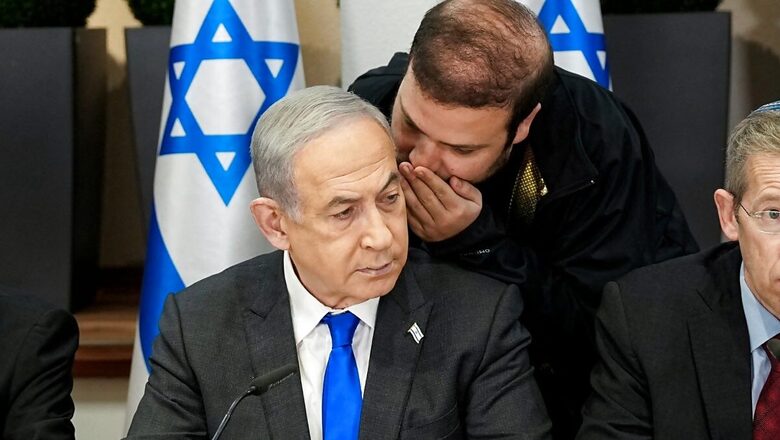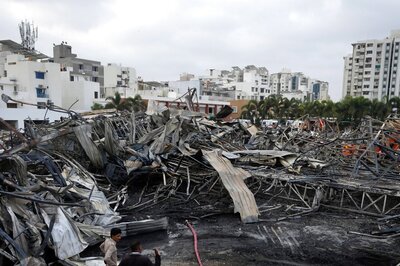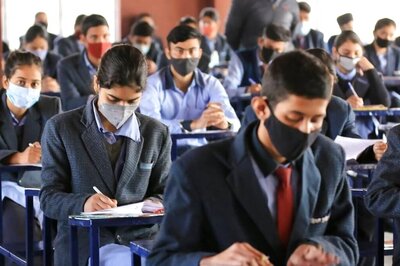
views
Israeli strikes pounded southern Gaza on Sunday, the 100th day of the war on Hamas which has claimed a surging civilian death toll and ravaged the besieged Palestinian territory.
The conflict, sparked by deadly attacks on Israel, has created a dire humanitarian crisis for the 2.4 million people in Hamas-ruled Gaza, the United Nations and aid groups warn, and reduced much of the coastal strip to rubble.
Israeli Prime Minister Benjamin Netanyahu, whose government has faced growing international pressure over civilian casualties in Gaza, vowed that “no one will stop us” from destroying Hamas.
The Hamas government media office said Sunday that “more than 100 people were martyred in the attacks last night until 6:00 am in all areas of the Gaza Strip”.
An AFP correspondent in Rafah, in southern Gaza near the border with Egypt, saw a thick column of smoke after strikes on the city where many displaced Palestinians have sought shelter in makeshift tents.
Fears that the conflict could spread across the wider region grew when new strikes hit Iran-backed Huthis in Yemen on Saturday, after the rebels warned of more attacks in solidarity with Gaza on what they deem Israeli-linked Red Sea shipping.
On the Israel-Lebanon border, which has seen regular exchanges of fire with Hamas ally Hezbollah, the Israeli army said it killed four gunmen who had crossed the frontier and “fired at the forces”.
Troops patrolling the Har Dov area — Israel’s term for the disputed Shebaa Farms district near the annexed Golan Heights — “engaged and responded with live fire”, a statement said, adding that “four terrorists were killed”.
The war began when Hamas launched an unprecedented attack on October 7, which resulted in about 1,140 deaths in Israel, mostly civilians, according to an AFP tally based on official figures.
Hamas, considered a “terrorist” group by the United States and the European Union, also seized about 250 hostages, 132 of whom Israel says remain in Gaza, including at least 25 believed to have been killed.
Israel launched a relentless military campaign that has killed at least 23,968 people in the Palestinian territory, mostly women and children, according to the Gaza health ministry.
After the International Court of Justice in The Hague heard arguments that accused Israel of breaching the UN Genocide Convention, Netanyahu insisted that Israel will “continue until victory”.
“No one will stop us — not The Hague, not the Axis of Evil and no one else,” he said at a televised news conference on Saturday, referring to the Iran-aligned “axis of resistance” groups in Lebanon, Syria, Iraq and Yemen.
Increased Pressure
The Israeli military said on Sunday its forces had struck rocket launching pits in the territory’s north and hit targets across the Gaza Strip including the main southern city Khan Yunis. Hamas’s military wing the Ezzedine al-Qassam Brigades reported “clashes with Zionist (Israeli) forces” in Khan Yunis.
Further south, 80-year-old Palestinian Nimma al-Akhras said a strike had destroyed her house in Rafah.
“We started to scream and I couldn’t move,” she recounted, “but someone pulled me out and put me on a cart.”
In Israel, Netanyahu’s government has faced growing calls to rescue the hostages who have now been held in Gaza for 100 days, with thousands rallying in Tel Aviv on Saturday to demand action.
“We will continue to come here week after week until everybody is released,” Edan Begerano, 47, told AFP.
Bashir al-Zayadna, whose uncle Youssef and cousin Bilal were taken hostage on October 7, said their return “is 100 days too late”.
“The war should end,” he said. “I wish to be able to hug them, to be able to tell them it’s all over.”
Israel’s largest labour union, the Histadrut, said hundreds of thousands of workers joined a 100-minute strike on Sunday.
“I hoped that a miracle would happen and we wouldn’t need to stand here today,” Histadrut chairman Arnon Bar-David told a Tel Aviv rally.
Israel, which after years of blockading Gaza imposed a siege as the fighting began, has said its ground forces have gained control over the territory’s north.
Traumatised Generation
At Rafah’s Al-Najjar hospital, mourners prayed near the bodies of slain relatives. One man, Bassem Araf, held up a photo of a child and said: “She died hungry … This is the resistance they are targeting in Gaza, just children.”
The Gaza Strip’s people suffer acute shortages of food, water, medicine and fuel, and the health system is collapsing.
“The massive death, destruction, displacement, hunger, loss and grief of the last 100 days are staining our shared humanity,” said Philippe Lazzarini, head of the UN agency for Palestinian refugees UNRWA, during a visit to Gaza on Saturday.
He warned an entire generation of children in Gaza were being “traumatised”, diseases were spreading and the clock was “ticking fast towards famine”.
Winter rains have exacerbated the dire conditions for 1.9 million Palestinian displaced by the violence, according to UN estimates.
Telecommunications have been partially restored in southern Gaza, an AFP reporter in Rafah said, after operator Paltel reported a complete outage on Friday.
In the occupied West Bank, where violence has surged since early October, the Israeli army said troops detained two sisters of Saleh al-Aruri, Hamas’s deputy leader who was killed in a strike in Lebanon this month.
The brother-in-law of Aruri, Awar al-Aruri, said the two women had been put into “administrative detention”, which allows for detainees to be held without charge or trial for renewable periods of up to six months.
The Palestinian Prisoners’ Club advocacy group said 5,875 Palestinians have been detained in the West Bank since the Gaza war began.
On a visit to Egypt, China’s Foreign Minister Wang Yi urged the establishment of a Palestinian state and a ceasefire in Gaza.
At a joint press conference in Cairo, Wang and his Egyptian counterpart Sameh Shoukry also called for “an international summit for peace” to find a “lasting solution to the Palestinian cause”.




















Comments
0 comment